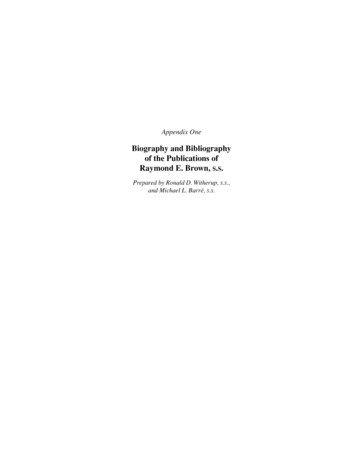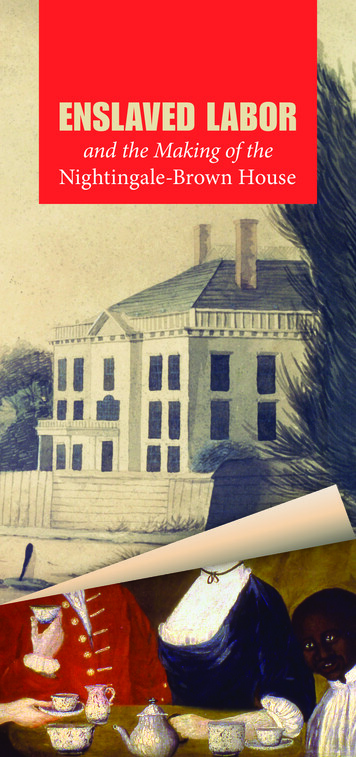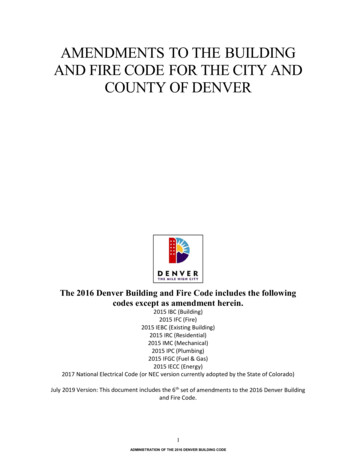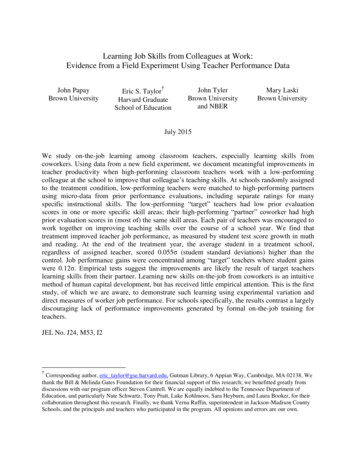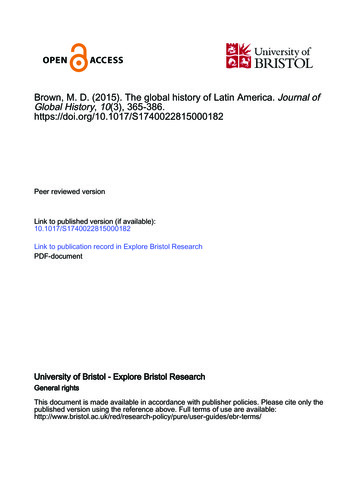
Transcription
Brown, M. D. (2015). The global history of Latin America. Journal ofGlobal History, 10(3), eer reviewed versionLink to published version (if available):10.1017/S1740022815000182Link to publication record in Explore Bristol ResearchPDF-documentUniversity of Bristol - Explore Bristol ResearchGeneral rightsThis document is made available in accordance with publisher policies. Please cite only thepublished version using the reference above. Full terms of use are licy/pure/user-guides/ebr-terms/
The Global History of Latin AmericaSubmission to Journal of Global History, 30 October 2014, revised 1 June 2015[12,500 words]Dr. Matthew BrownReader in Latin American Studies, University of Bristol15 Woodland Road, Bristol, BS8 1TEMatthew.brown@bristol.ac.ukAbstract [164 words]The global history of Latin AmericaThis article explains why historians of Latin America have been disinclined to engage withglobal history, and how global history has yet to successfully integrate Latin America into itsdebates. It analyses research patterns and identifies instances of parallel developments in thetwo fields, which have operated until recently in relative isolation from one another, shroudedand disconnected. It outlines a framework for engagement between Latin American historyand global history, focusing particularly on the significant transformations of the understudiednineteenth-century. It suggests that both global history and Latin American history will benefitfrom recognition of the existing work that has pioneered a path between the two, and fromenhanced and sustained dialogue.Keywords: Latin America – Historiography – Empire – Commodities – Decoloniality1
IntroductionLatin America is one star among many in the firmament of global history. Yet it rarelyshines brightly, is often overlooked, and has remained on the periphery of a way of writingabout history that consciously seeks networks and connections, and aspires to overcome olderimperial and colonial exclusionary narratives. The explanation can be found partly inhistoriography, in Anglophone historians’ (lack of) language skills, in the way historians choosetheir subject materials, and in the institutionalization of the writing of global and LatinAmerican histories. For these reasons, the spread of the discipline of global history has causedsome anxiety amongst Latin Americanists, who have been fearful of the loss of culture-specificknowledge, and the potential homogenization of the historical discipline.1 This article examinesthe links and divergences between Latin American history and global history. It argues that thegeographical and institutional locations occupied by historians, the languages they read andwrite, and their relationships with their perceived readerships, have been crucial factors inshaping disconnections between fields that should be intimately interconnected.2The first part of this article suggests that, because historians of colonial Latin Americaoperating within Atlantic history and African diaspora frameworks have been more likely toengage with global history than those focusing on post-1800 period, the disconnections anddivergences between Latin American history and global history have been most significant forthe nineteenth century, with major interpretative consequences.3 Because of the vacuumscreated by the historiographical discontinuities, too much global history and too much LatinAmerican history has situated Latin America as marginalised, passive or a victim. The final partof the article outlines a manifesto for combining global history and Latin American history,1Seefor example the 2013 campaign against the University of Oxford’s decision to freeze its Chair in LatinAmerican History, d by many historians of Latin America located globally. For a rigorous overview, see Matias Middel andKatja Naumann, ‘Global history and the spatial turn: from the impact of area studies to the study of criticaljunctures of globalization’, Journal of Global History, 5, 1, 2010, pp. 149-170.2 On historians, their locations and their readerships see Jorma Kalela, Making history: the historian and the uses of thepast, London: Palgrave MacMillan, 2012, pp. 40-55.3 For examples see W.H. McNeil, A world history, Oxford: Oxford University Press, 1967; Alfred Crosby, TheColumbian exchange: the biological and cultural consequences of 1492, Colorado: Westview, 1972; Sidney Wilfred Mintz,Sweetness and power: the place of sugar in modern history, New York: Penguin, 1986; Felipe Fernández-Armesto, Theworld: a brief history, London: Pearson, 2007.2
identifying the key periods and events which historians need to address in order to fullyintegrate the history of Latin America into analyses of global processes, and vice versa.4A history of disconnectionsIn 2012 Oxford University Press published the Oxford handbook of Latin American history, editedby José Moya.5 The book gives a sense of developments in the fields and diversehistoriographies that make up what is still called, with some reservations, ‘Latin American’history. Moya provides a lucid breakdown of the regional sub-categories of Euro-American,Afro-American and Indo-American histories, which he suggests provide more coherent unitsof analysis for post-1492 history. Moya concludes, nevertheless, that ‘Latin America’ remains aconvenient and recognisable label. In this he recognises the important advances inunderstanding the construction of ‘the idea of Latin America’, to use Walter Mignolo’s term.6‘‘Latin America’, a term never used on either side of the Atlantic before 1840, was an ideainvented by a transnational cosmopolitan elite born in Panama, Chile and Argentina, who wereintellectually active in Paris in the mid-nineteenth-century. What the ‘Latinity’ of parts ofAmerica actually meant has been disputed ever since the term was coined. It includes anopposition to ‘Anglo-Saxon’ North America, a shared history of colonialism, Catholicism, and,in the versions attributed to early twentieth-century thinkers like José Enrique Rodó, a degreeof spirituality and aestheticism lacked by rationalist Protestants to the north and in Europe.7In Moya’s volume, eminent scholars trace the contributions in agrarian history,economic history, indigenous history, and so on, which have changed the way specialisthistorians have thought about Latin America’s past over the last few decades. There is nochapter on the influence of global or world history on Latin American history. Indeed, thereare no references at all to how the writing of Latin American history has been influenced byglobal history. Non-Latin-Americanists might be surprised that a major historiographical shiftis not mentioned in this comprehensive regional body of analysis, but Moya and hisThis article was originally presented as a keynote lecture to the University of Oxford Centre of Global Historyworkshop on Latin America on 12 March 2014. I thank all of the participants for their suggestions forimprovement. I acknowledge the insights of the JGH editors and anonymous reviewers, and the formationalconversations I have had with Paula Caffarena, Joanna Crow, Paulo Drinot, Andrew Ginger, Nicola Foote, AlanKnight, Su Lin Lewis, Chris Manias, Fernando Padilla Angulo and Jonathan Saha which have assisted me inarticulating some of these thoughts.5 José Moya, ed., Oxford handbook of Latin American history, Oxford: Oxford University Press, 2012.6Walter Mignolo, The idea of Latin America, Oxford: Blackwell, 2001.7 Mignolo, Idea of Latin America Matthew Brown, From frontiers to football: An alternative history of Latin America since1800, London: Reaktion, 2014, pp. 87-91.43
contributors did not miss anything. They are correct that the influence of global history uponthe writing of Latin American history has been negligible.Latin American history is correspondingly underrepresented in world and globalhistory, an object of study only around certain key moments of conquest, rupture andrevolution. As A.G. Hopkins has observed, the writing of world history faces ‘formidableobstacles’ in which ‘attempts to give the endeavor coherence can easily become proxies,witting or unwitting, for a story that is already well known: the rise of the West – with orwithout the fall of the rest’.8 World history practitioners have become increasingly aware ofthese absences in their curricula, and debated how best to overcome them.9 The last twodecades have witnessed a creative tension between a world history that aspires tocomprehensive and comparative accounts of events and processes, and a global history thatfocuses on networks and connections in the shadow of contemporary globalization.10 Themarginalization of Latin America within both these approaches remains a mutual weaknessrequiring consideration, reflection and remedy.The disconnect between global or world history and Latin America has long beennoted. Patrick Manning commented in 2003 that the region was ‘curiously neglected in mosttreatments of world history’.11 Seven years later Rick Warner attempted to explain thecontinued breach in institutional terms:I would submit that Latin American historians themselves are poorly represented inthe membership and activity [ of] world historical communities anecdotally Ican probably count on two hands the number of Latin Americanists I have met overthe past decade at our conferences.12A.G. Hopkins, ‘The history of globalization – and the globalization of history?’, in Hopkins, ed., Globalization inworld history, London: Pimlico, 2002, pp. 11-46, p. 14.9 Patrick Manning, Navigating world history: historians create a global past, New York, Palgrave MacMillan, 2003,especially pp. 3-15.10 A.G. Hopkins, ‘The historiography of globalization and the globalization of regionalism’, Journal of the Economicand Social History of the Orient, 53, 2010, pp. 19-36.11Manning, Navigating world history, p. 90.12 Rick Warner, ‘Introduction: bringing Latin America into world history’, World History Connected, 7, 3, 2010,paragraph 3. The 2014 conference of the World History Association was held in Costa 013/10/WHA-Program-2014-final-1.pdf. One of its themeswas ‘Latin America in World History’.84
Those calling for better connections have often focused on teaching. In 1997, LanceGrahn proposed that university teachers adopt the themes of economics, politics and ideas toprovide an entry point for Latin America into world history survey courses.13 Warner’s attempt‘to energize the connections between Latin American studies and world history’ was aimed atcreating better classroom discussions in world history programmes in the U.S.14 LatinAmericanists there taught world history because they had to, and researched Latin Americanhistory because they wanted to. World history survey course textbooks, especially thoseincluding Latin Americanist authors or editors, have engaged with some key moments in LatinAmerican history, normally related to wars or political violence.15Whereas the multi-authored world history comparative approach has secured a placefor Latin America in teaching, global history research has not followed suit. Instead, the globalhistory approach that privileges connections and networks has often provided amethodological justification for single authors to concentrate on the regions, empires andcultures they were initially trained to research.One explanation as to why Latin Americanists have not embraced global history mightbe the high profile of the strand of global history represented best by Bruce Mazlish and AkiraIriye in their Global history reader. Their approach sets out to understand the processes that haveled to the present, globalised world. Historians are encouraged by Mazlish and Iriye and theirfollowers to seek to understand the world they live in. The problem with this approach is thatit relegates to the periphery the roads not taken, the processes and events that, whilstsignificant to contemporaries and indeed to other historians, did not lead to the world ‘we’ livein today. The Global history reader displayed a clear dichotomy between global history and LatinAmerican history. Of twenty-eight chapters, only two made more than cursory mention ofanywhere in Latin America: a study of how US-based environmental activists got involvedwith, and helped, Brazilian campaigns against environmental degradation, featuring thecelebrated martyred campaigner Chico Mendes; and a treatment of human rights abuses in theLance Grahn, ‘Integrating Latin America and the Caribbean into global history’, The Journal of General Education,46, 2, 1997, pp. 107-28.14 Warner, ‘Introduction’, paragraph 4. See also Paolo Castaño, ‘Latin America as a unit of analysis for worldhistory: some reflections’, World History Bulletin, 20, 2, 2004, pp. 30-36.15 Robert Tignor, Jeremy Adelman, Stephen Aron, Peter Brown, Benjamin Elman, Stephen Kotkin, SuzanneMarchand, Holly Pittman, Gvan Prakash, Brent Shaw and Michael Tsin, Worlds together, worlds apart: a history of theworld, from the beginnings of humankind to the present, New York: W.W. Norton, 2008; Bonnie G. Smith, Marc Van deMieroop, Richard von Glahn and Kris Lane, Crossroads and cultures: a history of the world’s peoples, London: St.Martins, 2008.135
Southern Cone in the 1970s and 1980s.16 Latin America thus appeared only as a bit-part actor.Latin Americans themselves are presented as victims rather than as active participants in globalhistory, and the pre-1950 history of the continent is entirely absent.17The premise that global history is predicated on a notion of how globalization isexperienced today is one that is wholly unsatisfactory for historians of Latin America, whohave developed deep-seated historical explanations of contemporary issues. In addition, LatinAmericans themselves of the eighteenth, nineteenth and twentieth centuries already had arealization of the global shadows that shaped their lives, just as clearly as do Anglophoneglobal historians writing today.18 The way in which global processes have been assimilated andincorporated into local histories has been part of the history of Latin America since well beforeLeslie Bethell’s Cambridge history of Latin America collections in the 1980s, to say nothing ofmore recent historical scholarship.19The global history of Latin America, therefore, is not the history of globalization writbackwards. Yet the historiography of global history has been up to now largely Anglo-centric.As Dominic Sachsenmaier has shown, the ‘environments of global history’ and the placeswhere the discipline is produced have in many ways mirrored the unevenness of the historiesbeing related.20 The focus of research in global history has been predominantly angled atexploring the shifting power dynamics between South Asia, China, and Europe or ‘the West’.Kenneth Pomeranz’s Great divergence did briefly mention Latin America, describing it as ‘a newkind of periphery’, as its resources and labour ‘abolished the land restraint’ elsewhere.21 Thatview – that Latin America was a periphery – is common in global history. The possibility ofLatin American agency has been neglected, and sometimes left out of research questionsBruce Mazlish and Akira Iriye, eds., The global history reader, London: Routledge, 2004, featuring Margaret E.Keck and Kathryn Sikkink, ‘Environmental activism’, pp. 135-45, and Jack Donnelly, ‘Human rights as an issue inworld politics’, pp. 158-68.17 Another example of how new approaches can repeat the absences and omissions of previous imperialnarratives can be found in Emma Rothschild’s work on the United Nations and world archives, in which the onlyengagement with Latin America is a handful of references to the existence of archives in Mexico. EmmaRothschild, ‘The archives of universal history’, Journal of World History [hereafter JWH], 19, 3, 2008, pp. 375-401.Compare this with the work of Latin Americanists, for example Maxine Molyneux and Nikki Craske, ‘The local,the regional and the global: transforming the politics of rights’, in Craske and Molyneux, eds., Gender and the politicsof rights and democracy in Latin America, London, Palgrave, 2002, pp. 5-14.18 Brown, From frontiers to football, pp. 67-112.19 Leslie Bethell, ed., Cambridge history of Latin America, Cambridge: Cambridge University Press, 1985-1988, 10volumes.20 Dominic Sachsenmaier, Global perspectives on global history, Cambridge: Cambridge University Press, 2011, whichotherwise does not engage with the questions raised in the present article.21 Kenneth Pomeranz, The great divergence: China, Europe and the making of the modern world, Princeton: PrincetonUniversity Press, 2009, p. 265.166
entirely. C.A. Bayly barely engaged with the continent, and the peripheral place he and othersallocated to Latin America has served to buttress claims that place China and South Asia, alongwith Europe, at the epicentre of global history.22One explanation for the neglect of Latin America is that global history is to somedegree a descendent of British imperial historiography, and thus still focuses primarily on thelands that once were painted red on the map, or where British soldiers fought battles and shedtheir blood. Assumptions about global agency have deep roots. John Darwin’s After Tamerlane:The rise and fall of global empires, 1400-2000, for example, conceded that, despite its title, ‘theproblem with which this book is concerned [is] the shifting balance of power and wealthwithin Eurasia itself in the last half-millennium’.23 A good corrective to Anglophone blindnessto Latin America for the nineteenth century is Jürgen Osterhammel, whose monumental Thetransformation of the world takes care to reflect seriously on Latin American events –independence, revolutions, urbanisation, extermination of indigenous peoples, for example.Latin America gets much more attention in Osterhammel than in Bayly, certainly. But there islittle difference in overall interpretation: Osterhammel brings Latin America back from themargins, but leaves it on the periphery of global processes.24This is the crux of the matter: the central questions asked by global historians haveoften been about East-West connections and comparisons. Latin America’s problematicidentification with ‘the West’ complicates this binary focus.25 Global historians and LatinAmerican historians have not always been asking similar questions – or speaking the samelanguage. This is not to advocate the ‘rediscovery’ of Latin America by global historians, butrather an argument for engagement with the region’s histories as a constituent part of globalprocesses, systems and networks rather than as a constantly peripheral victim.26C.A. Bayly, The birth of the modern world, 1780-1914: global connections and comparisons, Oxford: Blackwell, 2004, andthe critique in Charles Jones, American civilization, London: Institute for the Study of the Americas, 2007, p.52.23John Darwin, After Tamerlane: The rise and fall of global empires, 1400-2000, London: Penguin, 2007, p.490; Darwin,The empire project: The rise and fall of the British world system, 1830-1970, Cambridge: Cambridge University Press, 2009.24 Jürgen Osterhammel, The transformation of the world: a global history of the nineteenth century, Princeton: PrincetonUniversity Press, 2014, trans. Patrick Camiller. The author relies heavily on narrative overviews of Latin Americanhistory, and is prone to mistakes: of fact, as in the independence of Brazil (p.100) and of interpretation, as in theattribution of the term ‘Latin America’ to French strategists behind the invasion of Mexico in the 1860s (p.82),rather than to Latin Americans themselves in the 1840s, as discussed by Mignolo in The Idea of Latin America, citedabove.25 Marcello Carmagnani, The other west: Latin America from invasion to globalization, Berkeley, CA: University ofCalifornia Press, 2011.26 This call follows the trajectory established by Jorge Cañizares-Esguerra and Erik R. Seeman, eds., The Atlantic inglobal history 1500-2000, Upper Saddle River, NJ: Pearson, 2007.227
Explaining isolationThe disconnections between interpretations of Latin American history and global history,outlined above, rest on the ambiguous place that the writing of Latin American historyoccupies in the fields of world and global history. The following analysis of articles publishedin the two major journals, the Journal of World History (founded 1991, subsequently JWH) andthe Journal of Global History (founded 2006, subsequently JGH) illustrates the origins of thisambiguity, and explains how it persists.JWH is the longest-established journal focusing on global history, and its publishingpatterns show a strong focus on the Pacific World (it is based at the University of Hawai’i).The founding and long-time editor was Jerry Bentley, who worked on cultural encounters inthe premodern world, and the current editor is Fabio López Lázaro, a world historian whoworks on colonial Spanish America.27 A review of the articles published in JWH demonstratessome clear patterns relating to the type of history of Latin America that it has attracted andpreferred. Out of 304 articles published between 1991 and 2015, 20.5 have a focus on LatinAmerica. (Where articles are explicitly comparative between somewhere in Latin America andsomewhere else, I have allocated 0.3. or 0.5, according to the depth of the comparison – this isa rough and ready form of calculation and the results should be treated accordingly). 20.5articles ‘on’ Latin America out of 304 equates to 6.4% of the total dealing in any detail withLatin American history. Those articles that engage with Latin American history areoverwhelmingly focused on the colonial period (fifteenth to eighteenth centuries), while thenineteenth and twentieth centuries appear very infrequently. This is most likely explained bythe preference amongst world history researchers for themes relating to the conquest andcolonization of Spanish America, over modern or republican Latin America. A relative paucityof studies of Latin America in the journal from 1991 to 2004 was followed by a rise in thenumber of articles in the mid-2000s, followed by a falling off recently. This pattern might beexplained by the temporary rise in the popularity of Atlantic history in the mid-2000s amongsthistorians of the post-1750 period.28JGH is the younger of the two journals addressed here. Like JWH, it has also publisheda small minority of articles dealing with Latin America. In comparison to JWH, nevertheless,See for example Fabio López Lázaro, The misfortunes of Alonso Ramírez: the true adventures of a Spanish American with17th century pirates, Austin: University of Texas Press, 2011.28 For a discussion of this historiographical trend see Brown and Gabriel B. Paquette, ‘Between the age of AtlanticRevolutions and the Axial Age’, in Brown and Paquette, eds., Connections after colonialism: Europe and Latin America inthe 1820s, Tuscaloosa: University of Alabama Press, 2013, pp. 6-10.278
JGH has taken Latin America rather more seriously as a participant in global networks andprocesses. Its more modern/contemporary focus seems the most likely explanation here. Somepatterns can be usefully traced. Of the 174 articles published, 16.5 have looked in depth atanything linked to Latin America. That is around 9.4% of the total. A review of the subjectmaterial of those articles provides us with a useful overview of the types of Latin Americanhistory which have engaged with global history. There is no clear pattern, but rather a variety ofspecialised research projects and divergent historiographies: the histories of labour,nationalism, the Cold War, economics, gender, Ernesto ‘Che’ Guevara, human rights andcommodities. The lack of pattern is reflective of the weak integration of the concerns of LatinAmerican history and global history, but this diversity is also one of the great strengths ofglobal history, engaging cultural, political, economic and material history, and bringing theexperience of understudied regions into dialogue with places elsewhere. The recent issue ofJGH on Sport, edited by Matthew Taylor, shows clearly the benefits of a global historyapproach for Latin Americanists. Paul Dietschy’s article on the global football body FIFAdemonstrates the way that its governance and politics were shaped post-WWI by nonEuropeans and especially Latin Americans.29 The apparent over-representation of LatinAmerican national teams in FIFA World Cups, and their apparent over-achievement in thosecompetitions, compared to size of population, territory and economic wealth, was previouslyexplained in cultural terms (i.e., Latin Americans are intrinsically ‘good at’ football). Dietschyexplains this through practical, economic and geopolitical factors rooted in the 1920s and1930s. The origins of football and other modern sports in Latin America were resolutelyglobal, linked to cultural and commercial networks encompassing the whole world, rather thannational or imperial as has been suggested in the past.30 The absence of Latin America’s agencyin these processes can be explained by the ongoing disconnect between scholarly productionof world history narratives, sports history and Latin American StudiesIn summary, the JWH has published 6.4% of articles on Latin America, and JGH 9.4%.These figures do not seem unreasonable, though it is clear that Latin America is still underrepresented on some scales. In terms of land-mass, Latin America is usually held to occupyaround 13% of the world’s land-surface area. In 2013 the population of the landsPaul Dietschy, ‘Making Football Global? FIFA, Europe and the non-European Football World, 1912-1974’,JGH, 8, 2, 2013, pp. 279-98.30 See Matthew Brown, ‘British Informal Empire and the Origins of Association Football in South America’, Soccerand Society, 15, 2-3, 2015, pp. 167-82.299
conventionally understood to be part of Latin America (the republics of Argentina, Bolivia,Brazil, Chile, Colombia, Costa Rica, Cuba, Ecuador, El Salvador, Guatemala, Honduras,Mexico, Nicaragua, Panama, Paraguay, Peru, Uruguay and Venezuela) represented around 8%of the global population (603 million out of 7.1 billion). Latin American history is therefore alittle under-represented, but by no means absent, at least in terms of publications in the majorjournals as measured against the size of the territory.31The point remains to explain why Latin American history has not yet made thetransition from a subject of research by global historians, to full integration into theexplanatory models of global history. The historiographical and institutional parts of theanswer respond to regional differences in the development and conditions of theprofessionalization of the historical discipline in the twentieth century. Historians of LatinAmerica working in non-English/Spanish/Portuguese speaking Europe seem to have found iteasiest to engage with global history, without having to messily disengage from imperialhistoriographies that have left Latin America on the periphery. Spain has followed the Britishmodel, with its own ‘imperial’ history divorced from ‘Latin American’ history (with theexception of the work of pioneers like Josep Fradera).32 Some Spanish historians, such asCarlos Barros, have hoped that global history would revitalise their ‘moribund’ nationalhistoriography.33French historians of Latin America have taken the lead here, perhaps indirectlyinfluenced by the universal history advocated by Fernand Braudel and others. The journalAnnales, which ‘has always sought to transcend its prestigious heritage by continuallypresenting the most innovative research in the field of history’, has published numerous worksof global history.34 This has included work on Caribbean and Latin American history and‘colonised memories’, global paradigms beyond the Atlantic, diaspora and globalrepresentations of the tropics during the enlightenment.35 The separate development of histoireA similar observation might also be made for Itinerario, International Journal on the History of European Expansion andGlobal Interaction, which focuses on 1500-1950.32 For example Josep Fradera, Colonias para después de un imperio, Barcelona: Bellaterra, 2005; Alfred W. McCoy,Josep M. Fradera and Stephen Jacobson, eds., Endless empire: Spain’s retreat, Europe’s eclipse, America’s decline,Madison: University of Wisconsin Press, 2012.33 Carlos Barros, ‘La historia que viene’, Revista Historia e Espacio, 18, 2002, pp. 185-226, p. 207.34 Mission statement at www.annales.ehess.fr [accessed 15 July 2014].35 For example the special sections on ‘The West Indies and Europe in the eighteenth century’, and ‘Colonisedmemories’, Annales, 68, 1, 2013; Cécile Vidal, ‘Pour une histoire globale su monde atlantique ou des historiesconnectés dans et au-delà du monde atlantique?, Annales, 67, 2, 2012, pp. 391-413; Paul-André Rosental,‘Migration, sovereignty and social rights: protecting and expelling foreigners in Europe from the early 19th century3110
croisée is another factor. The influence of François-Xavier Guerra and Annick Lempérière inParis, supervisors of numerous Latin American doctoral students, encouraged comparative andtransnational histories of Latin America.36 A similar trend can be noted in work coming out ofthe Latin American History centre in Berlin. The theme of the 2014 conference of theAssociation of Historians of Latin America in Europe (AHILA), held in Berlin, was preciselythe challenges for Latin American history within its global context.37In the United States, Latin American history has been taught as part of world historycourses and therefore integ
5 José Moya, ed., Oxford handbook of Latin American history, Oxford: Oxford University Press, 2012. 6 Walter Mignolo, The idea of Latin America, Oxford: Blackwell, 2001. 7 Mignolo, Idea of Latin America Matthew Brown, From frontiers to football: An alternative history of Latin America since 1800, London: Reaktion, 2014, pp. 87-91.



